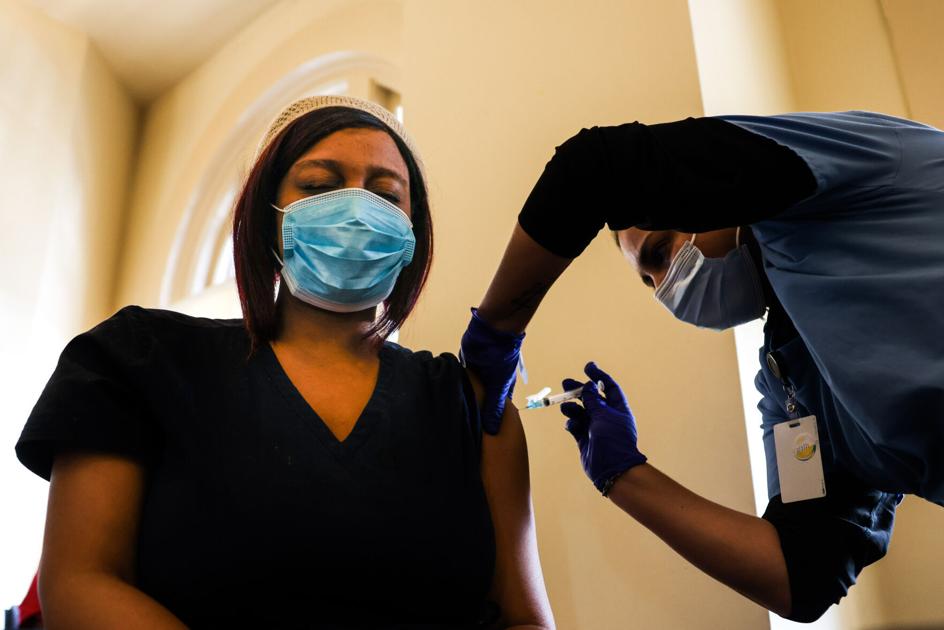A new extra transmissible, more dangerous COVID-19 strain could reverse falling case numbers and hospitalizations across Colorado if more people do not get vaccinated, health officials warned Tuesday.
The Delta variant, also known as B.1.617.2, is about twice as contagious as the Alpha variant, also known as B.1.1.7, from the United Kingdom and accounts for 40% of new COVID-19 cases statewide as of May 30, state epidemiologist Rachel Herlihy said during a news conference this week. Those infected with the Delta variant are also more likely to be hospitalized, she cautioned.
Relaxed COVID-19 restrictions, more people forgoing face masks indoors and increased social gatherings may have helped the strain spread quicker, said Colorado College professor Phoebe Lostroh, who has a Ph.D. in microbiology from Harvard University. Because the strain is doubling nationally about every two weeks, Lostroh said she assumes there is now a “very high percentage” of the Delta variant statewide.
“We are going to absolutely see this variant spread across Colorado if more people do not get vaccinated,” she said. “The situation is changing very quickly and because this variant spreads so well it could reverse the downward trends we’ve seen in incidence rates and hospitalizations.”
Data from the Colorado Department of Public Health and Environment early Tuesday afternoon show the Delta variant has been identified in 24 Colorado counties. With 63 cases identified, El Paso County has Colorado’s second largest concentration of the new strain, identified in India in December, according to state data. Mesa County, in western Colorado, is home to the largest concentration, with 248 cases.
Additionally, there are 10 cases of the strain in Adams County, nine in Arapahoe County, five in Denver County, 13 in Douglas County, two in Jefferson County and one in Teller County.
COVID-19 case numbers and hospitalizations have been falling across Colorado and reaching lows in some areas not seen since before the winter peak. At the same time, most counties have still not reached the state’s goal to inoculate 70% of eligible residents with at least one dose by July 4, despite incentive efforts such as Colorado’s vaccination lottery.
State data on Tuesday showed only Denver and Jefferson counties had reached this goal, with 71.7% and 74.1% of their respective populations vaccinated.
About 68% of Douglas County residents are vaccinated, 63% in Arapahoe County, 61.9% in Adams County, and 51% in Teller County. El Paso County lagged behind with just 50.1% of residents inoculated, according to county data that does not include federal vaccination numbers.
“The presence of variants is directly correlated to the prevalence of vaccinated persons in the community,” said Dr. Richard Zane, chief innovative officer at UCHealth and professor and chairman of Emergency Medicine at the University of Colorado School of Medicine. “Vaccines are like a wall. They prevent the variants from coming in. If you’re not vaccinated, you’re not protected against anything.”
Vaccines continue to be the most effective defense against COVID-19, Zane said, likening vaccination to one’s social responsibility as well as patriotic duty.
“This disease doesn’t spread with vaccinated people,” he said. “Let’s stop talking about how interesting this new variant is and do something about it. Doing something about it means getting vaccinated.”
Vaccine effectiveness against the Delta variant is slightly lower than the Alpha variant, Herlihy said this week. The Pfizer vaccine is about 88% effective against the Delta variant, compared to its 93% effectiveness against the variant from the United Kingdom. Zane and Lostroh said the Moderna vaccine will likely have the same effectiveness, though it was unclear how effective the Johnson and Johnson vaccine could be.
“These vaccines are still extremely effective against hospitalization and death,” Zane said. “This is now an inexcusable illness to be hospitalized with or die from.”
It’s not clear whether the Delta variant can infect younger or healthier people more easily, Lostroh said.
“We do know that it is infecting younger and healthier people. But we don’t know if that’s because older people are already likely to be vaccinated, or if it’s because the Delta variant is more dangerous to younger people.”
Coloradans should continue wearing face masks, social distancing and frequently washing their hands when they are around others whose vaccination status they are unsure of, Lostroh said.
This content was originally published here.

